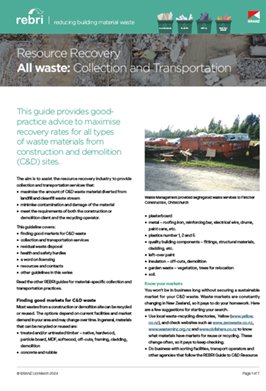
REBRI Resource Recovery All waste: Collection and Transportation (PDF)
Free
Product Description
This guide provides good practice advice to maximise recovery rates for all types of waste materials from construction and demolition (C&D) sites.
The aim is to assist the resource recovery industry to provide collection and transportation services that:
- maximise the amount of C&D waste material diverted from landfill and cleanfill waste stream
- minimise contamination and damage of the material
- meet the requirements of both the construction or demolition client and the recycling operator.
This guideline covers:
- finding good markets for C&D waste
- collection and transportation services
- residual waste disposal
- health and safety hurdles
- a word on licensing
- resources and contacts
Disclaimer: Please note that our publications reflect the regulations and best practices on the date of release, which is shown on the publication. As regulations and industry standards evolve, we always recommend that our publications be read in conjunction with the latest building code clauses and standards.
- other guidelines in this series.
| Publication date | 1 March 2024 |
|---|---|
| Author | BRANZ |
| Product type | Book |
| Availability | Available |
| Product code | BR013 |